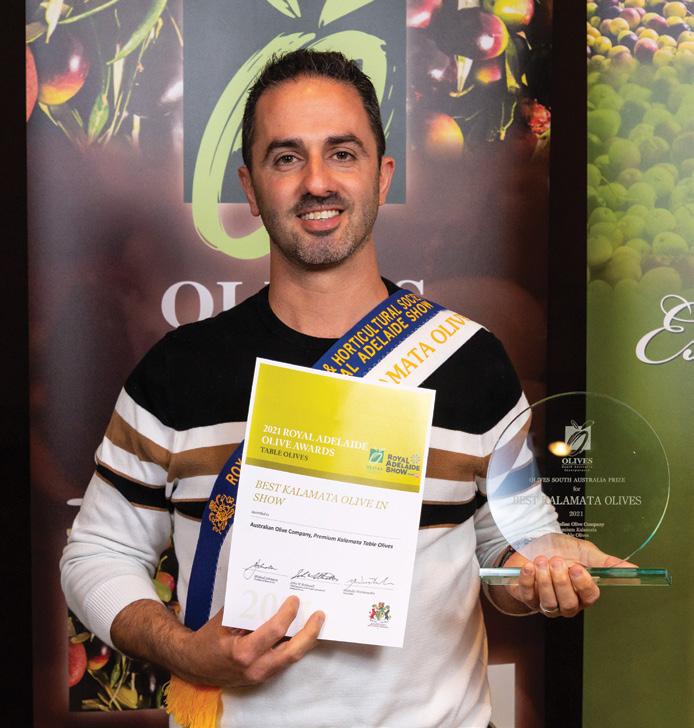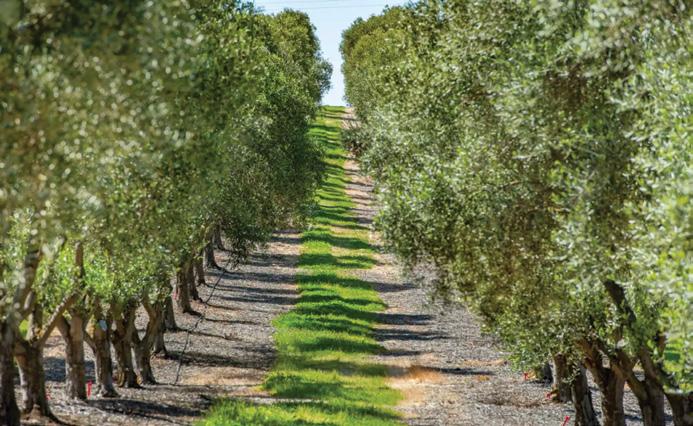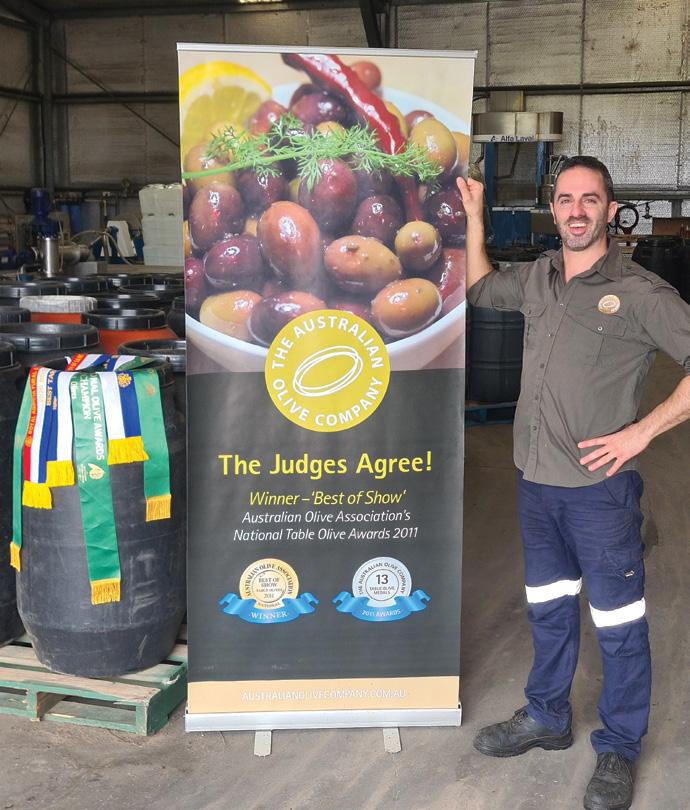
8 minute read
Ancestral history inspires award-winning olive business
Ancestral history inspires awardwinning olive business
When a shared heritage brought a passionate team of olive-loving LebaneseSouth Australians together in business, little did they know they’d end up running one of the most awarded table olive companies in Australia.
Advertisement
That’s the story behind Fleurieu Peninsula producer the Australian Olive Company, which continued its multi-year, multi-medal success at the 2021 Australian International Olive Awards (AIOA) with a trilogy of Gold, Silver and Bronze awards for its premium table olives.
That win followed an even bigger haul at the 2020 AIOA, where the AOC earned another Gold for it’s Premium Kalamata Table Olives, along with two Silver and two Bronze medals, this time shared among both table olive and EVOO entries. That in turn followed another triple-medal success in 2019, with another Gold and two Silver awarded to AOC’s table olives.
Their consistent success was also achieved at a state level, with Royal Adelaide Olive Awards results including Best Kalamata of Show, Best Regional Oil, two Gold and three Bronze medal in 2021; Best Table Olive in Show, Gold, two Silver and two Bronze in 2020; and Best Wild Olives, Best Specialty Olives, Gold and two Silver in 2019.
Background
The AOC story began in the early 2000s, when the Chehade family - Karl Snr and Jnr – purchased a young established olive grove at Finniss on South Australia’s Fleurieu Peninsula. Founders of the Karl Chehade Dry Cleaning business, they initially envisaged it as a hobby farm for Karl Snr’s ‘retirement’. They later added another nearby grove to their holding, however, and with time and significant investment, created a fullyintegrated olive enterprise with a national market.
They also added a kindred spirit to the business, with former football fitness coach Peter Reaich joining 10 years ago and working into the role of Operations Manager.
Reaich said that despite their respective backgrounds, olives were a ‘natural fit’ for all of them.
“We’re all of Lebanese background, so olives are part of our ancestry and culture, where our villages are surrounded by olive groves and olive presses that provide a living for the village’s inhabitants,” he said.
“It was only natural that we continued this legacy, especially in South Australia with the same Mediterranean climate as Lebanon.”
Dual-purpose grove
The AOC groves have over 17,000 dualpurpose trees, utilised for both EVOO and table olives. Varieties include Kalamata, Frantoio, Koroneiki, Pendolino, Leccino, Jumbo Kalamata, Verdale, Manzanillo and Barnea, all of which thrive in the Fleurieu’s coastal climate. The trees are traditionally spaced, and all are now aged over 25 years.
Quality return on investment
Reaich said all of AOC’s trees are “extremely healthy and productive, thanks to careful and regular maintenance”.
“We put a lot of effort and investment into looking after our trees and grove in general, with regular pruning, irrigation, nutrition programs and spray regimes every year” he said.
“We realise that the more you invest in the trees and grove in general, the fewer issues you will have and the higher quality you will work with in the factory, on the processing side.
“In particular, we have been investing in giving back to our unique soil ecosystem, with less reliance on chemical pesticides and increased generation of ground cover to increase soil carbon and the fungal microsystem of our soils.”
Healthy and unique terroir
Together with their location, Reaich said, these and their production practices contribute to the quality of AOC’s fruit and of the products they make.
“Coming from an isolated part of the Southern Fleurieu Peninsula, surrounded by hayfields and vineyards, we have a healthy and unique terroir that translates into a distinctly beautiful aroma and flavour for our oils and table olives,” he said.
“And being so close to the ocean and Lake Alexandrina gives us a strongly maritime
The AOC’s award history is a long one, including two Best of Class and Best of Show at the 2011 National Table Olive Awards, presented by then-AOA CEO Lisa Rowntree to Delele Chehade, Karl Chehade Snr and Karl Chehade Jnr.
The pros and cons of life as an EVOO producer There are good and not-so-good aspects to every job, and olive production is no different. When we asked Peter Reaich to name his pros and cons, his responses were both philosophical and practical. “The best part is working with a product of the land that is not only ancient and helped build civilisations, but that my ancestors worked with and now I am able to be part of that history, today. “The downside today is the greater challenges we are facing due to climate change, that are bringing about drier conditions, earlier ripening and greater variability in yields. “Not long ago, our on and off years were pretty consistent but now we are having record high and record low years. That makes it much more difficult to manage sales forecasts and volumes, and harvest workloads, and for overall business decision-making.”
2021 was an outstanding year for the Australian Olive Company across the board, with Peter Reaich collecting both the Best Kalamata and Best Regional Oil of Show trophies at the Royal Adelaide Olive Awards.
climate, which helps negate the detrimental effects of extreme hot and cold temperatures.
“We also operate our own on-site processing plant, allowing us to quickly and efficiently process our olives directly from the grove. Timeframes are crucial when harvesting and processing olives, and this ensures freshness and superior quality in both our EVOO and table olives.” Olive ‘apprenticeship’
While he obviously has a natural affinity with olives, those important practices were learned on the ground, Reaich said.
“My apprenticeship was working under the previous manager for two years, before I took over. That’s how I learned most of the everyday harvest, processing and grove activities,” he said.
“It was complimented by short courses provided from the AOA, reading books, and always speaking with members of the olive community, most of whom have had a long and vast legacy in the olive industry.
“Every day, you learn something new about olives … and the beautiful thing about it is that there is always still so much to learn.”

FOR SALE
LOWDEN
Preston Valley Grove, off-grid 154 acres
3 2 154ac
area
Attractive picturesque 62.6581ha of olive grove and pasture lands situated approx. 17kms from Donnybrook or 15kms from Ferguson Valley. A comprehensive working farm operation complete with farm manager that has been there for most of the development of this property; olive oil production, processing and harvesting services through to wholesale supply. Quality Dorper sheep production and distribution. Stock, machinery and Olive business are separate to the land. The homestead commands an impressive position overlooking the workings of the farm, grove sheds and water system.

EXPRESS 28 DAY SALE All offers presented by 4pm 16th Sept 2022 (unless sold prior)
PETER JOHNSTON 0439 971 150

Ongoing grove maintenance, combined with a maritime climate, ensures AOC’s trees remain healthy and productive.
Join the olive community From fitness coach to olive production manager is a steep learning curve, so we figure Peter has got some pretty good advice for other producers making their way in the industry. Here are his tips, gleaned from his own experience. “Don’t be afraid to ask questions and speak to other growers in the industry. “Although most other profit-making industries might not show unity, the olive industry - particularly in SA - is a close and tight-knit community, and everyone is always willing to give a helping hand.” National market and scale
The size and productivity of their groves is echoed in the scale of AOC’s production scale, which is also reflected in their marketing.
Currently all AOC products are sold only in bulk, as 10kg buckets or 150kg drums of olives, and 20L drums or 1,000L IBCs of EVOO. Sales are both local and interstate, to mainly food-service providers and retail shops.
It’s an enviable position logistically, and one no doubt made possible by the company’s well-earned reputation for consistently high quality and dependable product supply.

Satisfaction, prestige and recognition
Reaich said all the effort and investment they put into their grove and products is made worthwhile by accolades like their awards from the Australian International.
“There’s a sense of satisfaction in knowing that what we are doing is not only working but is also working well,” he said.
“It is a nice reward for both the workers and management, for all our persistence and hard work.
“And also for our business. It gives us added prestige and recognition, as the awards become more illustrious every year, with more and more local and international entries. In turn, we are able to market our many awards over the years to consumers, as a distinct selling point which gives us a promotional advantage.
“Quality competitions like the AIOA are extremely valuable, to the industry and also to consumers. For growers, they provide the opportunity to showcase their skills and innovations on a grander scale, and to achieve much deserved recognition for their efforts.
“And consumers don’t want to spend their money on inferior products, but unfortunately, our current EVOO and table olive market is saturated by cheaper and lesser quality products from overseas. When local producers win medals and awards from the competitions, they are able to market this, providing the consumer with assurance of a better quality product.”
More information: www.australianolivecompany.com.au.










